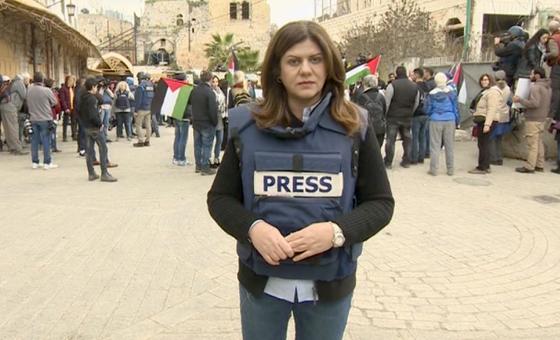A UN Human Rights Council-appointed probe into alleged rights violations in the Occupied Palestinian Territory (OPT), including East Jerusalem, and Israel, wrapped up a week of public hearings in Geneva on Friday that included testimony on the killing of veteran US-Palestinian journalist Shireen Abu Akleh.
The session – mandated by the Human Rights Council – forms part of the Commission’s ongoing investigative work.
First-hand accounts
Its objective was twofold, explained Commissioner Chris Sidoti: First, to understand the designation of seven Palestinian non-Government organizations, human rights organizations, as unlawful organisations and six of them as terrorist organisations.
Recording first-hand information on the killing of Shireen Abu Akleh formed the second part of the week’s activities.
“These are not the sole focus of our investigation at all, but rather we see them as particularly significant in giving us a better understanding of the overall situation of civic space, civil society and throughout that region, throughout the occupied Palestinian territories and Israel”, Mr. Sidoti continued.
In total, 13 witnesses and victims of civil society organizations and legal representatives provided testimony to Commissioners Navi Pillay, Mr. Sidoti and Miloon Kothari at the public forum.
Family mission
One woman, Lina Abu Akleh, has sought justice and accountability for the killing of her aunt, Ms. Abu Akleh, on 11 May 2022.
The experienced television journalist, who was very familiar with reporting in the OPT, was killed as she attempted to report on an arrest operation by Israeli Security Forces and clashes in Jenin refugee camp in the northern occupied West Bank.
Following her killing, the UN human rights office, OHCHR, alleged that Israeli forces were behind the fatal shooting, and not indiscriminate Palestinian firing.
In September, the Israeli authorities announced that there was a “high possibility” that Ms. Abu Akleh had been hit accidentally by the Israeli military.
“It is really important for these public hearings to be held because it allows us the space to share our testimonies, the experience and the suffering we had to endure over the past six months, but also it allows our voices to get across and our messages and our demands. It’s because it’s unfortunate that the Commission of Inquiry cannot access the territories”, said Lina Abu Akleh.
“The lack of accountability, the lack of justice is what pushed me to advocate for my Aunt Shireen”, she added. “It’s the importance of getting justice and getting her message across, is what continues to push me towards our pursuit”.


